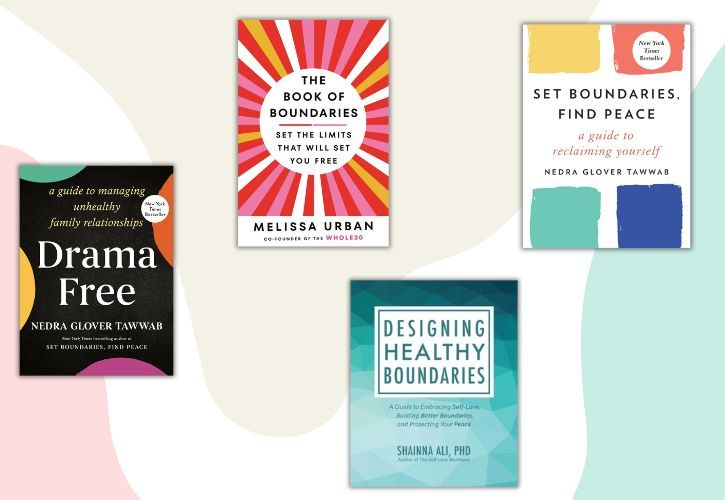How to Set Boundaries With Family Without Feeling Guilty
The concept of family boundaries isnt new: The term first started gaining traction in the psychology and self-help field in the 1980s. It can relate to the limits and rules we set for ourselves within relationshipsto safeguard our emotions and our timeand it can also mean assertively communicating your needs when it comes to healthy and balanced interactions with others. And, recently, boundary-setting has gone viral. There are countless Instagram reels, TikToks, articles and books filling our media landscape as whats called therapy-speak that infiltrates popular culture. Going to therapy has been increasingly normalized, whether thats from scenes in mainstream TV shows or the fact that a large number of us sought out mental-health support during the pandemic.Many millennial and Gen Z adults lucky enough to have access to affordable therapy consider it a fundamental way to take care of their emotional health and general well-being, without any of the hangups that earlier generations might have had. They can converse about therapy and mental health in fluent terms, casually trading therapist recommendations and waitlist tips with peers. But when younger family members advocate for firm boundaries or drop therapy-speak into conversation, loved ones from other generations might still bristle, or even characterize it as self-indulgent. We turned to the experts to unpack the trend and explain why there seems to be a generation gap.
Setting healthy boundaries with family
Melissa Urban, author of The Book of Boundaries: Set the Limits That Will Set You Free, firmly believes that learning to enforce healthy boundaries is a skill that can benefit all of us. She says the pandemic underscored the value of recognizing and setting limits.We realizedespecially working momsthat work and home and school and kids and relationships and household management all bled together in a way that they had never done before, says Urban. We desperately needed boundaries in order to protect our time and energy, our mental health and our capacity.But a cultural shift was already underway before the pandemic hit, Urban says, as many of us learned more about advocating for healthy relationships (whether in the home or the workplace). Movements such as #MeToo influenced many women, especially, to take a hard look around, to speak up more often about social justice issues and to feel more confident assessing and vocalizing what is unacceptable. Now they are asserting themselves in terms of taking responsibility for their own needs and feelings, and expressing thosein partin the form of boundaries, says Urban. I think all of this has been fuelled in a really good way by the connectivity of social media. People who have grown up online tend to find speaking to a general audience less vulnerable than talking to someone in their own life, she adds. It can feel easier for them to tell TikTok about their mental-health struggles than it can be to tell their own parents.Social media algorithms have also played a role. Once someone is interested in a topicsuch as boundariestheyll start to see more content about the same topic on their feeds, she adds. And the more they become a part of these online communities and see others destigmatizing certain topics and offering support, the more they feel empowered to take action.But theres a problem: The boomers in their life are not always on the same page (or fed the same algorithms). If a millennial tells an older family member, for example, that their behaviour is overstepping or too demanding, that family member may respond that the millennial is unappreciative of their efforts or is acting selfish.Meanwhile, Gen Xers tend to fall somewhere in between. Some people lean more toward a millennial mindset and others identifying with the older generation. Whats clear is that differing expectationswhether its about time spent together, grandparenting roles, finances or input on life choicescan leave everyone feeling frustrated and hurt.Take Sarah Jennings.* From the time she was a child, she found that her mother was over-involved in her life, with those very blurry boundaries continuing as she grew into adulthood. But, she says, she never addressed it until she was in her late 40s and a busy mom of three. During that time, her boomer parents expectations about receiving a phone call every dayas well as their habit of making daily unannounced visits to her family homebecame too difficult to ignore.It caused problems in my marriage. My husband was like, Why is your mother here again? says Jennings. But when she doesnt get her way, she pouts and there are temper tantrums.Eventually, Jennings stopped the daily calls, and in retaliation, her parents gave her the silent treatment for a while. She also moved a few towns away, which made those unplanned visits less frequent.Janet Setrakian,* a baby-boomer grandmother in her early 70s with adult daughters in their 30s and 40s, also clashes frequently with her daughters when it comes to setting boundaries. She believes this is mostly due to social class divides: how she grew up (with financial instability, as the oldest daughter born to a single mom raising five kids) versus how she raised her daughters (solidly middle-class, in a university-educated nuclear family of four).While her adult millennial daughters want her to accept, in general, that its okay to put yourself first and be assertive about what you need in your lifeand what you dont or cant tolerate, capacity-wiseSetrakian finds that difficult to put into practice, especially when it comes to long-standing family dynamics with her financially insecure adult siblings. It would seem cold-hearted to avoid or cut out problematic relatives, she says, or even just to choose not to spend holidays or vacations with them. Shes had a lifetime of learning to accommodate or work around the challenges of family members with frequent marital drama, mental-health and substance-use issues and unpredictable life decisions.To her, this is what family means: always being there for each other, no matter whateven if its a rollercoaster of emotions. Meanwhile, her adult daughters argue that it isnt healthy for her to constantly absorb and oblige her siblings problems. They urge her to prioritize some stress-free leisure time apart from her extended family.(Related:How to Avoid Family Conflict This Holiday Season)
Now they are asserting themselves in terms of taking responsibility for their own needs and feelings, and expressing thosein partin the form of boundaries, says Urban. I think all of this has been fuelled in a really good way by the connectivity of social media. People who have grown up online tend to find speaking to a general audience less vulnerable than talking to someone in their own life, she adds. It can feel easier for them to tell TikTok about their mental-health struggles than it can be to tell their own parents.Social media algorithms have also played a role. Once someone is interested in a topicsuch as boundariestheyll start to see more content about the same topic on their feeds, she adds. And the more they become a part of these online communities and see others destigmatizing certain topics and offering support, the more they feel empowered to take action.But theres a problem: The boomers in their life are not always on the same page (or fed the same algorithms). If a millennial tells an older family member, for example, that their behaviour is overstepping or too demanding, that family member may respond that the millennial is unappreciative of their efforts or is acting selfish.Meanwhile, Gen Xers tend to fall somewhere in between. Some people lean more toward a millennial mindset and others identifying with the older generation. Whats clear is that differing expectationswhether its about time spent together, grandparenting roles, finances or input on life choicescan leave everyone feeling frustrated and hurt.Take Sarah Jennings.* From the time she was a child, she found that her mother was over-involved in her life, with those very blurry boundaries continuing as she grew into adulthood. But, she says, she never addressed it until she was in her late 40s and a busy mom of three. During that time, her boomer parents expectations about receiving a phone call every dayas well as their habit of making daily unannounced visits to her family homebecame too difficult to ignore.It caused problems in my marriage. My husband was like, Why is your mother here again? says Jennings. But when she doesnt get her way, she pouts and there are temper tantrums.Eventually, Jennings stopped the daily calls, and in retaliation, her parents gave her the silent treatment for a while. She also moved a few towns away, which made those unplanned visits less frequent.Janet Setrakian,* a baby-boomer grandmother in her early 70s with adult daughters in their 30s and 40s, also clashes frequently with her daughters when it comes to setting boundaries. She believes this is mostly due to social class divides: how she grew up (with financial instability, as the oldest daughter born to a single mom raising five kids) versus how she raised her daughters (solidly middle-class, in a university-educated nuclear family of four).While her adult millennial daughters want her to accept, in general, that its okay to put yourself first and be assertive about what you need in your lifeand what you dont or cant tolerate, capacity-wiseSetrakian finds that difficult to put into practice, especially when it comes to long-standing family dynamics with her financially insecure adult siblings. It would seem cold-hearted to avoid or cut out problematic relatives, she says, or even just to choose not to spend holidays or vacations with them. Shes had a lifetime of learning to accommodate or work around the challenges of family members with frequent marital drama, mental-health and substance-use issues and unpredictable life decisions.To her, this is what family means: always being there for each other, no matter whateven if its a rollercoaster of emotions. Meanwhile, her adult daughters argue that it isnt healthy for her to constantly absorb and oblige her siblings problems. They urge her to prioritize some stress-free leisure time apart from her extended family.(Related:How to Avoid Family Conflict This Holiday Season)
Generational views on mental health
Setrakian points out that while so-called healthy boundaries might be top of mind for educated, upper-middle-class people, they may be of little value to people who experience more financial struggles, like her relatives. Yes, the tensions are there, but these families are not spending a lot of mental energy on boundaries, she says. And so many people cant afford therapy like this. Even if they did, I doubt that boundaries would be on the top of their list of traumas to mitigate, she adds.The reality, she says, is that many families need one another in order to survive. Theyre relying on family connections for childcare, or short-term help with cash, or emergency housing.Setrakian admits that her skepticism over the importance of boundaries is likely consistent with others in her generation. I realize that this response looks like a typical defensive boomer perspective, she says. And yes, therapy-speak is a total turnoff to me. But, she adds, she cant shake the perspective that there are much bigger problems in the world to focus on than pop-psychology self-improvement tips.When older generations were childrenif they were raised in authoritarian householdstheir emotional needs were not deemed to be as important as survival needs, says Victoria Kulchytska, a registered social worker with Peachey Counselling and Family Support in Burlington, Ont. People who had lived through the Second World War or who had experienced poverty had priorities that were more survival-focused, she explains.Many boomers carried forward this tough mindset, and a my house, my ruleswhatever I say goes parenting philosophy, into their own adulthood. Unused to questioning their parents while growing up, these boomers may struggle with a younger generation that advocates for their needs, Kulchytska says.This can play out in the workplace. For example, when a millennial or Gen Z person speaks up about unfair treatment or harsh working conditionssomething a boomer might have quietly endured for decades and has grown to accept. It can also manifest within an extended family when an older relative tolerates toxic or taxing behaviour from an adult sibling, and, like Setrakian, disagrees with characterizing this tolerance as enabling.Kulchytska says some people of younger generations who grew up with authoritarian parents may have felt invalidated or criticized in childhood. Millennialsespecially girlsmay not have had the chance to learn how to communicate and enforce healthy boundaries and needs, so they might have developed coping mechanisms such as people-pleasing, she says. Theyre learning about healthy boundaries later in life, as adults (often from social media).
Why setting boundaries is so important
If applied properly, boundaries can create new behaviour patterns without worsening, or severing, relationships, experts say. In fact, firm boundaries can strengthen those relationships.Boundary-setting is a fundamental life skill that we arent taught in school. It’s not often modelled by our parents and were certainly not taught it in the workforce. But it brings benefits into every area of our lives, Urban says.That includes everything from reducing anxiety and resentment to protecting time and energy, she explains. Setting boundaries can also help people preserve relationships by giving them the opportunity to be honest and open about how they feel, instead of quiet resentment or avoiding interactions altogether. Doing so can even lead to ripples of change throughout the entire family. Very often you can be the changemaker […] so everybody sees more clearly how they feel, and is more respectful of everybodys limits, Urban says.As an example, Urban points to a grandmother who once emailed her with pride about how she successfully set boundaries with her adult daughter around babysitting. [The daughter] was using her mother as free babysitting at any time, because shes retired and the daughter assumed she didnt have anything better to do. But the mother has hobbies, and sometimes shes not in the space where she can hang out with the kids for hours, Urban says.Finally, the mother had a conversation with her daughter. She told her that while she loves spending time with her grandkids, she would like to be asked if she’s available to watch them before they’re dropped off without notice. She was really nervous to have that conversation, but it went well, Urban says.
How to gently set boundaries with family
1. Timing is keyFirst and foremost, the discussion needs to happen outside of a conflict. It will not work as well during conflict. There needs to be time for both parties to feel calm and regulated to talk about it, Kulchytska says. If every time you go to your mothers house you get upset because she asks when youre planning to have a baby, for example, its perfectly acceptable to draw a boundary around discussing it before the scenario comes up. Call ahead of time, and say, Hey Mom, I cant wait to see you for dinner. Listen, I need you to know that I would like you to stop…’2. Give them the benefit of the doubtWhen it comes to setting boundaries around receiving advice or discussing certain topics, its common for older family members to feel hurt or shut out when their intention may have been to help. To remedy this, Urban suggests that they proactively ask questions like How can I support you? or Would you like to talk about it with me?It can go a long way in making sure the person on the receiving end is feeling supported and that you get to help in a way that you know actually makes a difference, she says.3. Protect your peaceIf a family member ignores your boundary, re-engage, rephrase and repeat it. If that doesnt work, remove yourself from the situation. Communicate the consequence of not having your boundary upheld, and then follow through. This is not intended as punishment, Kulchytska notes. In fact it’s about not participating in behaviours that enable a harmful situation to continue. This can look like: If you cannot do Xrespect my boundarythen I will do YI will walk away.Boundary statements communicate your needs, and if another person cannot respect these, then what needs to be communicated is the plan the boundary-setter intends to take to protect themselves, Kulchytska. The goal of following through on your consequence is not to influence the other person, she adds. Rather, the goal is to protect yourself. If it does influence the other person, then thats a bonus.Urban adds that it can be helpful to create a personalized escalation plan. For example, the first time a relative crosses a boundary youve already communicated, instead of storming out of the room in a huff, you might gently remind them to respect that line. The second time it happens, politely say, Okay, Im going to go for a walk.In subsequent interactions, communicate that youll have to further change the way you engage with this person. Lastly, the final step could be to lessen the amount of time you spend together. Knowing that you are responsible for holding your boundary can feel empowering, and avoids you feeling as though you need someone else to do something in order to uphold it, Urban says.
How cultural differences affect boundaries
Kulchytska notes that in her experience, members of immigrant families from collectivist cultures sometimes have a harder time setting personal boundaries. Due to their socialization and upbringing, putting their own needs first on the priority list may be traditionally viewed as selfish, she says.Zara Jawad,* a millennial immigrant and young mother, knows that feeling well. She experienced years of anxiety trying to juggle her household responsibilities while studying to bring her foreign credentials to Canada. On top of this, she had difficulty meeting the intense expectations of her husbands large extended family. Jawad would say yes right away to every social invite his relatives gave her familywhich could often mean several gatherings on a given weekendand even preparing multiple meals or dishes for each visit. Once it started taking a mental and physical toll, she put her foot down as an act of self-careeven if that meant causing more family tension.Jawad had to unlearnor train herself out offeeling constantly obligated to others ideas, plans and wishes. Today, she is slowly becoming more confident at standing firm in knowing what is best for her and her family.My priority with any family event now is asking myself, Where will my daughter have fun? And I see how I feel: Will I feel happy after I come back from this event? Who am I meeting? Would it be triggering for me? Thats how I make my decision, she says. She now takes more time to consider cooking requests and accepts them less often.While Jawad admits that she wonders what her husbands relatives think of her now, she tries to remind herself that it doesnt matter. I just couldnt do it anymore, she says. Fortunately, her husband saw how unhappy she was and has been supportive of her new approach. He checks in with her before saying yes to family plans and will speak up for her to relatives who might criticize her for declining an invitation.
When to seek help
If boundary-setting on your own isnt working, seek a family counsellor. It’s important to do so before things get bad, says Kulchytska. Drawing that line can be more effective at preventing problems if you do it when you first start to notice issues brewing. Youll get optimal results because its still manageable. You dont feel like its out of control…and you havent reached a breaking point, she says.Whether its a relatively minor boundary issue (such as an overly meddlesome mother-in-law) or a more serious problem (such as a relative with substance-use issues always asking for money), the principles of boundary-setting remain the same, adds Kulchytska. When a person is used to be being a broken record restating the same boundaries and its not working, they would have to remove themselves from the situation to prevent more harm.Family therapy works best when everyone recognizes that they need strategies around boundaries and are willing to make changes. However, if there is a high degree of conflict, individual therapy to support the boundary-seeker is a better option, Kulchytska notes.Jawad says that in her experience, you cant go into therapy sessions expecting that others will amend their behaviour. Its more about self-advocacy and empowerment. Then you’ll put a plan in place to protect yourself from their behaviour if nothing improves. Meanwhile, when family members come in for counselling together, rather than assigning blame, the counsellor will often focus on remaining neutral. Professionals know how to validate feelings, asking both sides what their needs are and trying to find a way to satisfy those needs.In situations where there isnt as much cooperation, the onus is placed on the boundary-setter to do the work, says Kulchytska. Boundaries are about advocating and protecting yourself from the negative impact that the person might have on you.
The best books about boundary-setting
For more expert advice on setting healthy boundaries, check out these newer titles, all released in the last couple of years.The Book of Boundaries: Set the Limits That Will Set You Free, by Melissa UrbanBestselling author Melissa Urban calls herself The Boundary Lady and has built a large following on social media and on podcasts for doling out self-advocacy advice to recovering people-pleasers. Her book, which came out in October 2022, helps guide readers to set firm limits.$30, amazon.caDesigning Healthy Boundaries: A Guide to Embracing Self-Love, Building Better Boundaries and Protecting Your Peace by Shainna AliThis resource by mental-health counsellor Shainna Ali was published in February 2023 and is formatted as a workbook with prompts, activities and journal reflections.$25, amazon.caSet Boundaries, Find Peace: A Guide to Reclaiming Yourself by Nedra Glover TawwabThis March 2021 release from licensed therapist Nedra Glover Tawwab is another New York Times bestseller and includes CBT techniques for anyone who needs a little help learning how to say no, or how to better deal with toxic individuals in their lives. She has nearly 2 million followers on Instagram, where youll find holiday-survival tips and handy self-assessment listicles. She also offers free worksheets and sells conversation decks and flip charts.$23, amazon.caDrama Free: A Guide to Managing Unhealthy Family Relationships by Nedra Glover TawwabReleased in February 2023, this book is a companion to Nedra Glover Tawwabs first bestseller, Set Boundaries, Find Peace and focuses on dysfunctional family patterns. $38, amazon.caNext:I Worry About Other Peoples Problems Like Theyre My Own. How Can I Set Healthy Boundaries?
The post How to Set Boundaries With Family Without Feeling Guilty appeared first on Best Health.
